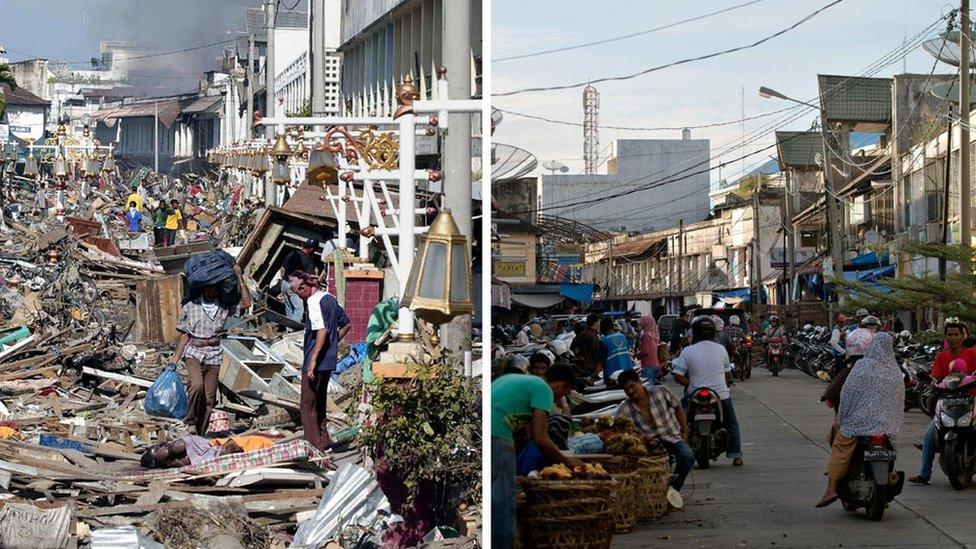The Indian Ocean tsunami remembered by those who survived it
- Published
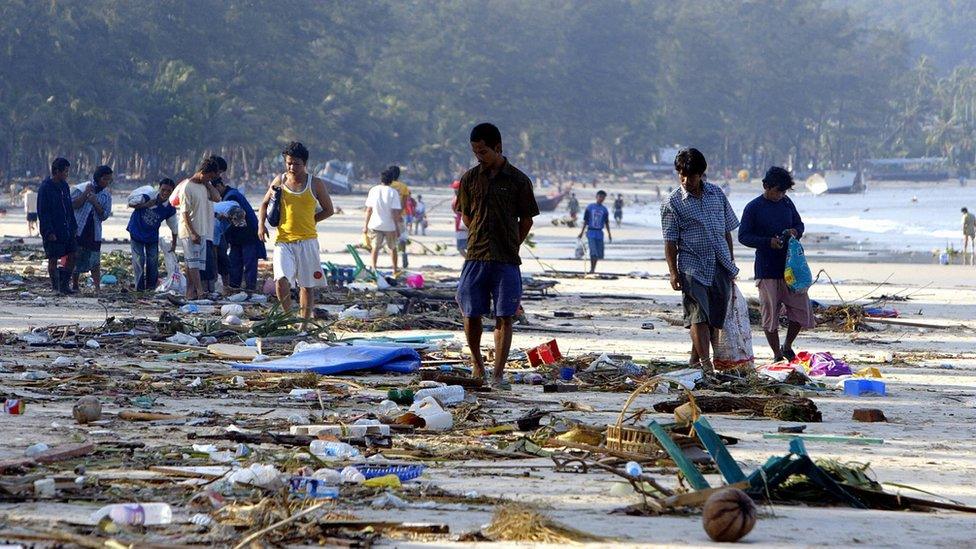
Survivors walk through the debris on Phuket's Patong beach the day after the tsunami
Shortly before 08:00 on 26 December 2004, a magnitude-9.1 earthquake struck under the sea in northern Indonesia.
In the hours that followed, a massive tsunami fanned out across the Indian Ocean, killing close to 230,000 people, most in Indonesia.
Ahead of the 15th anniversary of the tragedy, BBC Thai's Chaiyot Yongcharoenchai visited southern Thailand, which was devastated by the tsunami.
This is the story of some of those who survived and what they did to help afterwards. You may find some of the details distressing.

Wittaya Tantawanich - emergency worker, Patong beach
That morning on Patong beach was very quiet. I was stationed close to Patong Hospital on a rescue truck. Then I got hungry, so I drove toward the beach in order to find something to eat.
Dr Weerawit Sarideepan - then-doctor at Vachira Phuket Hospital
It was the day after the hospital staff party - it was my day off and I had a long lie-in. At 08:00, I heard my wooden bedroom windows were shaking. I told my wife that it must be from the car outside. Then I rolled back to sleep.
Samran Chanyang - master of ceremonies and mortician at Yan Yao temple
I led the prayer ceremony on the morning of 26 December 2004, which was a Buddhist holy day. I said the prayer into the microphone, so everyone could hear it. All of a sudden, we lost the power and we felt the earthquake. I continued without the speaker afterwards.
Wittaya Tantawanich
I sat there to enjoy my breakfast with the beach view. As I sat there, I felt the earthquake at around 08:00. No one panicked or worried. I continued to sit there waiting to get an emergency call.
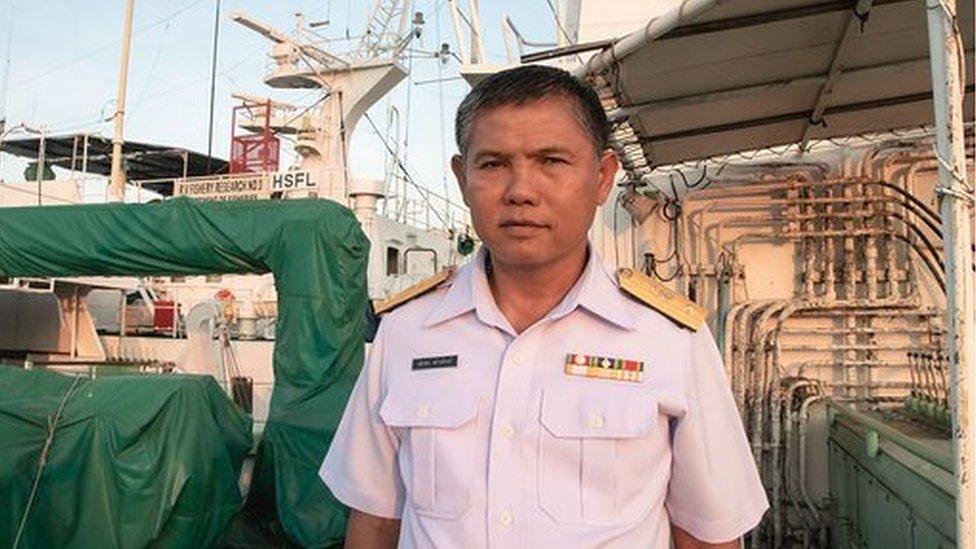
Captain Sathaporn Sawangpuk's ship rode the tsunami wave
Sathaporn Sawangpuk - captain of the Mahidol ship
We were on our way back from a month-long marine research trip in the Indian Ocean. We made a stop at Koh Racha Yai island in Phuket for a diving lesson for our interns. The sea was quite calm, the sky was so clear and blue. I told my team: 'What a perfect day to be in the sea.'
Primpraow Jitpentom - nurse on a diving trip near the Mahidol ship
I took my friends from Bangkok out for a diving trip on that Sunday morning. I did this many times but my husband had never seen the underwater world. I told him it was really worth it.
Captain Sathaporn Sawangpuk
After breakfast, we all went to the end of the boat on the deck to watch the intern diving with instructors. All of a sudden, I felt the ship lift and swing to the left and to the right. We had no idea what happened, but my instinct told me to start the ship and head out to the middle of the sea.
Primpraow Jitpentom
Our speedboat was getting closer to the shore. All of a sudden, the diving instructor told the boat driver to stop since he noticed something was wrong. He pointed to the sea and told me there was no water at the beach. He told me: 'This can't be good.'
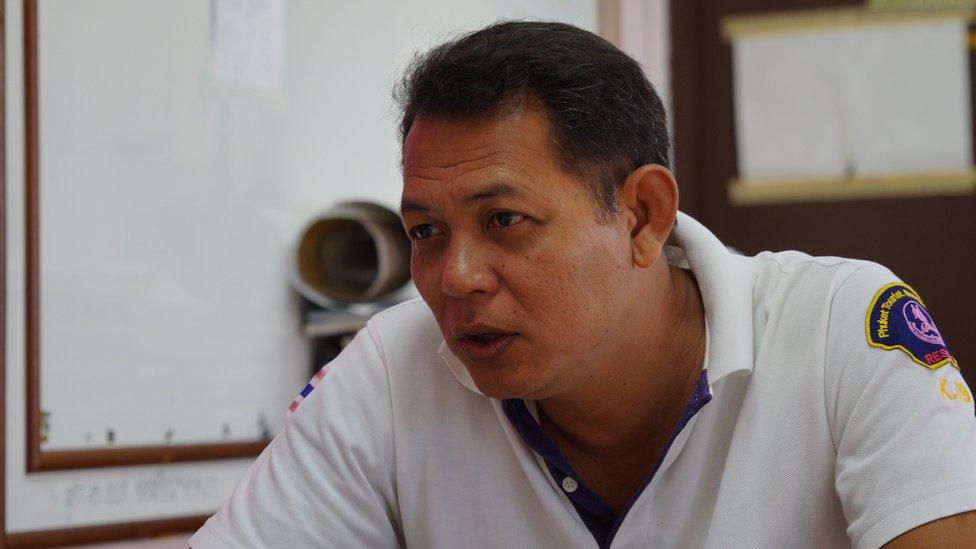
Emergency worker Wittaya Tantawanich: "I closed my eyes, prayed, and prepared to die"
Wittaya Tantawanich - on Patong beach
At 10:00, I started to hear local food sellers, they were pointing to the beach. They all said 'Let's go catch fish.' The water had gone down very far, to the middle of the sea, and there were many fish lying around all over the place. I chuckled at what I saw but it wasn't long before I realised something was wrong. As the water came back, one food seller ran back and told everyone in that area to run away from the beachfront as far as possible.
Captain Sathaporn Sawangpuk
As I looked toward the shore of the island, I saw one big wave hit the beach and sweep umbrellas and chairs down into the sea.
Wittaya Tantawanich
It didn't look like the killer wave you see in the movies. What I saw at first was just a flash flood that brought a massive amount of water. As the flood got closer, it started to pick up speed. Finally it hit street level and the water continued to rise. I hopped back in my truck and drove up the hill. At that moment, everything was crazy. So many people were running away from the water.
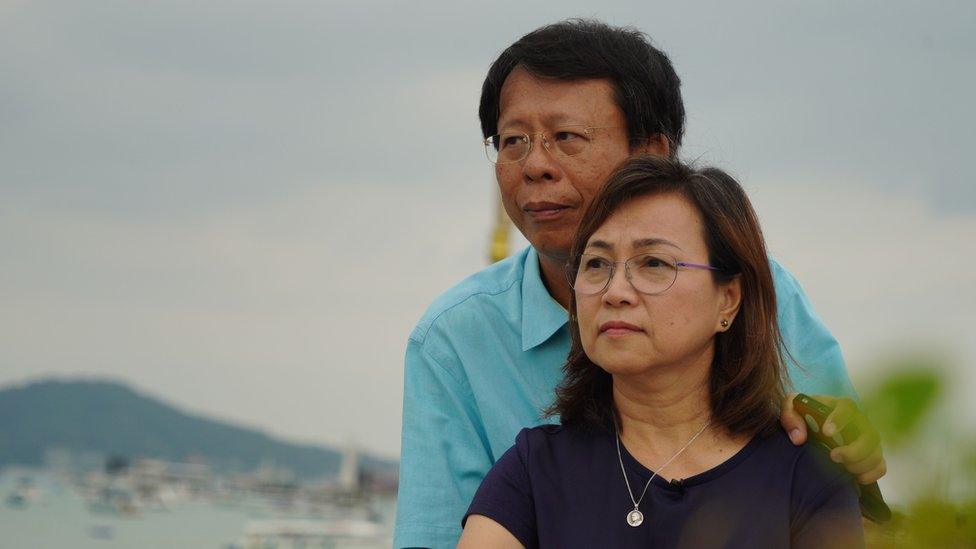
Somchai and Primpraow Jitpentom, who treated the injured while on holiday
Somchai Jitpentom - doctor on diving holiday with his wife
I contacted my friend who was in the navy and he told me it was a tsunami. He told us to find a big ship and get up there. I saw the Mahidol ship was on its way out from the bay, so we stopped them and asked for help.
Captain Sathaporn Sawangpuk
Then the water went down, so far out, before the second wave hit the beach again. This time it dragged bungalows and restaurants down to the sea with it.
Somchai Jitpentom
As we got on the ship, I saw houses and restaurants on Koh Racha Yai pulled down into the sea. That's when I realised something serious had happened. So we all agreed that we should go help other people on the nearby island since we had two doctors and two nurses on board.
Primpraow Jitpentom - nurse, and Somchai's wife
I held my sons tight in my arms and told them 'Mummy and Daddy love you very much. If anything happens, just stay afloat in this life vest. Don't try to swim, someone will come to find you and help you.'
Wittaya Tantawanich - on Patong beach
I heard on my walkie-talkie that the second wave had hit. It didn't take long before the whole city was in mayhem. I went back down after the second wave retreated. At that point, I still had no idea what had happened. All I knew was I had to help people.
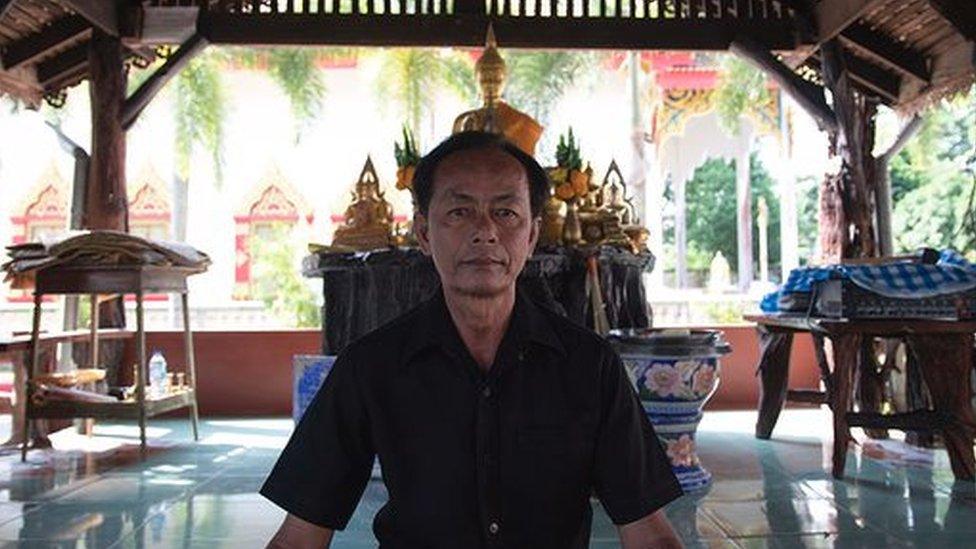
Samran Chanyang was called to duty while knowing his son was missing
Samran Chanyang - master of ceremonies and mortician at Yan Yao temple
The ceremony ended just like any other day. Then I went back home, right behind the temple.
Suddenly I heard a lot of cars go by on the main street. All of them were speeding through and honking and they passed by the area. Then villagers here started talking about how villages along the beach here were all gone because of the wave.
Dr Weerawit Sarideepan - then-doctor at Vachira Phuket Hospital
When I woke up again around 10:00, I took my family out for breakfast before I received a phone call from the hospital calling me in for an emergency. We had a plan to handle a disaster of a massive scale. But we didn't have a plan for something this big.
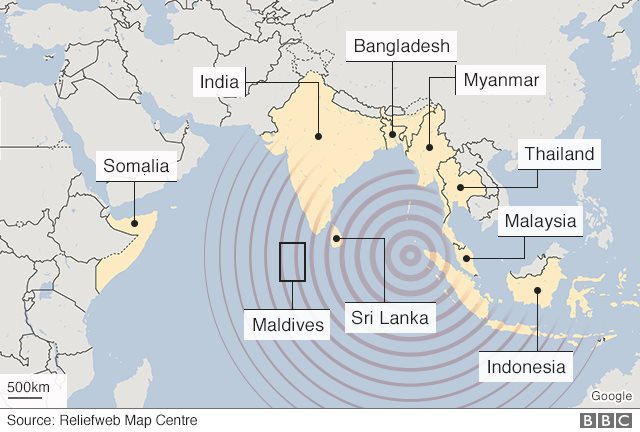
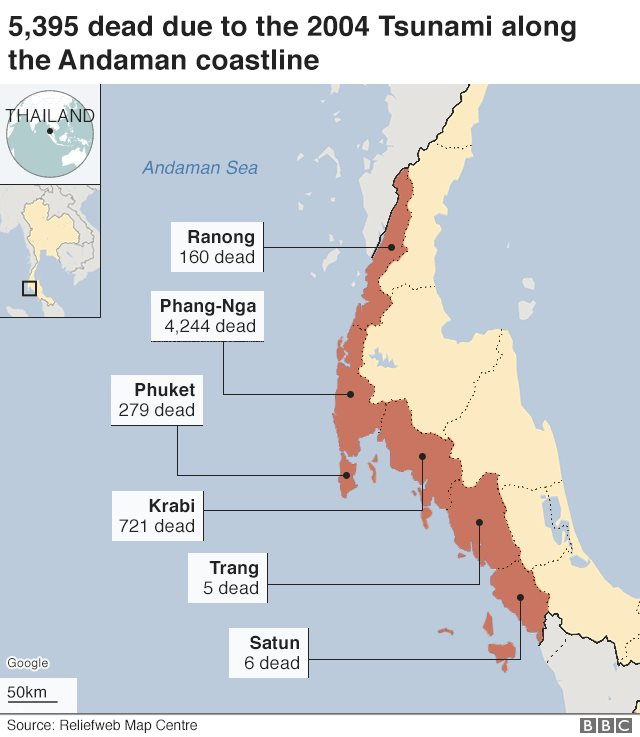

Wittaya Tantawanich - on Patong beach
I got a request to go to a supermarket on the beach road where many people were trapped inside. When I arrived, I saw staff floating face down in the water that flooded the basement of the building. Some of them were still alive but many of them were dead.
Samran Chanyang - at Yan Yao temple
I turned on the TV and saw what happened in my area. I didn't know about the tsunami until then. I was shocked and worried since my son had gone to work in Khao Lak [on the mainland coast north of Phuket]. He was a painter and it was meant to be the last working day for him before a long break. I contacted him, but I was unable to reach him.
Primpraow Jitpentom - on diving trip
We decided to head toward Phi Phi island as it wasn't too far and they had been badly hit. When we arrived, it wasn't something I expected. All I saw were dead bodies floating in the water.
Wittaya Tantawanich
As we tried to help more people in the supermarket, I heard from outside that another wave was coming. I was looking for the nearest way out but I knew I wouldn't be able to make it. So I closed my eyes, prayed, and prepared to die. Luckily, it came up to street level and stopped.
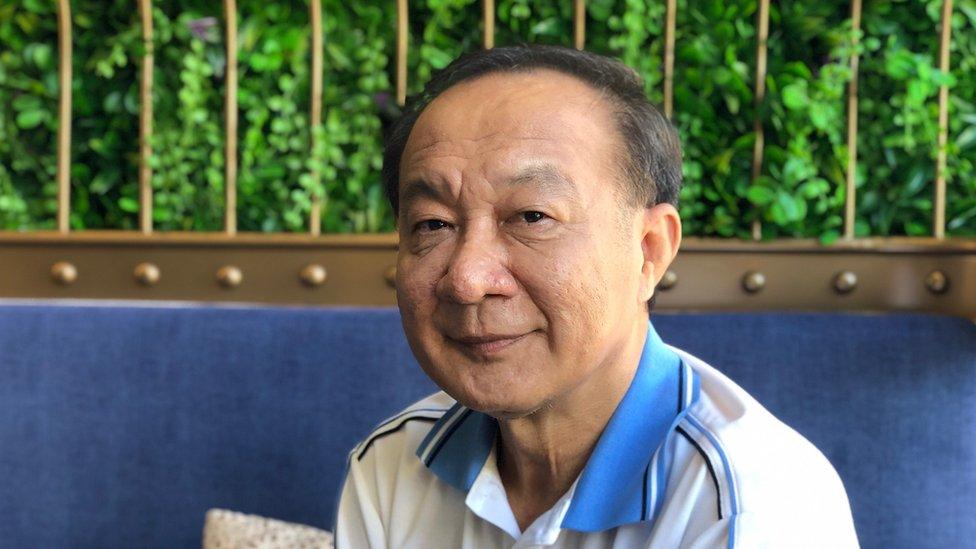
Dr Weerawit Sarideepan: "There were thousands of dead bodies waiting to be identified"
Dr Weerawit Sarideepan
Hundreds of people were sent in. Most of them had broken bones or cuts on their bodies. Then dead bodies started to come in.
Samran Chanyang - at Yan Yao temple
My son's three friends told me he was missing. I was about to go out looking for him but then the hospital contacted me. They said they needed a place to put dead bodies from the wave so I had to be on standby at the temple waiting for the hospital to deliver the bodies. By 19:00, hundreds of dead bodies start to arrive. We had no place for them so they were wrapped in plastic and white sheets before laying on the ground all over the temple.
Dr Weerawit Sarideepan
The hospital director asked me to go to help implant microchips into the dead bodies as requested by the forensic police. When I first arrived, the local police took me to Wat Yan Yao, where there were thousands of dead bodies waiting to be identified. As I stepped into the temple, I could smell dead bodies the way I never had before in my life. I noticed the temple ground covered in blood and lymph.
Primpraow Jitpentom - on diving trip
We decided to help only the injured survivors and we finally rescued at least 414 tourists and locals, and transferred them to a more equipped hospital on Phuket. We were happy to help many people that day.
Samran Chanyang
The following day, more bodies start to come in. The military started to bring in containers to keep the bodies in. By the middle of the second day, I saw a mountain of dead bodies piling up and it was very sad to see.
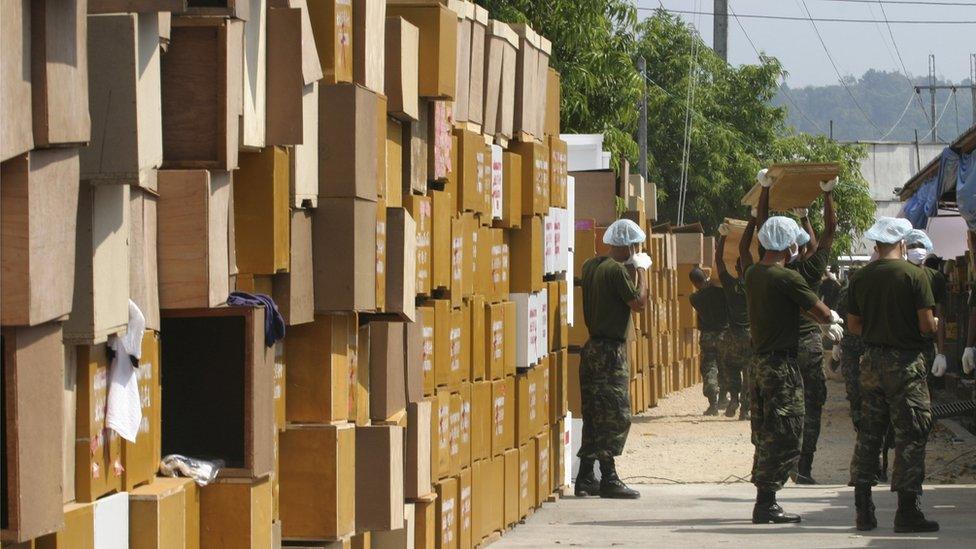
Hundreds of coffins lie inside Yan Yao temple in December 2004
Samran Chanyang
I went out with my other sons and friends to look for my eldest son. It took me half a day to find him. He was trapped and died inside the building where he was.
Wittaya Tantawanich - on Patong beach
I'd been a rescue worker all my life but I'd never experienced anything that huge before.
Captain Sathaporn Sawangpuk
It was a wave like no other.
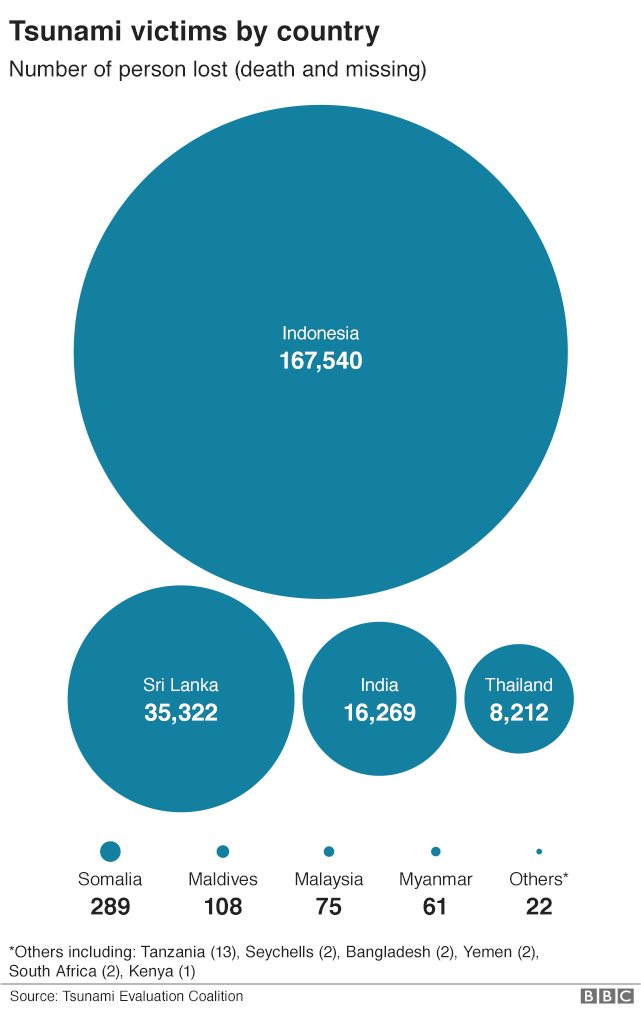

- Published25 December 2014
